Van mounted platforms: What are the latest trends?
14 November 2022
Access International delves into the latest trends in the van mounted platform sector.
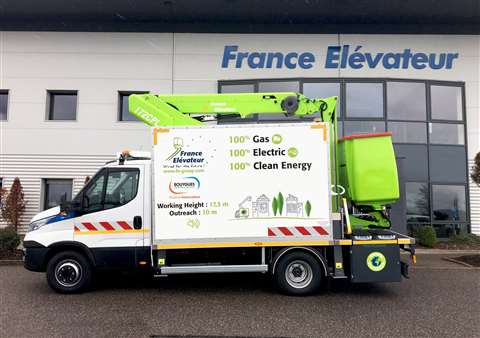 France Elévateur 172 CPL gas model. (Photo: France Elévateur)
France Elévateur 172 CPL gas model. (Photo: France Elévateur)
There has been significant movement in the van mount sector in recent months, thanks mainly to the acquisition of France Elévateur (FE Group) by Time Manufacturing Company in June.
France Elévateur, known as the FE Group, also comprises FE Benelux, FE Deutschland, and Spanish vehicle mounted producer Movex.
US-based Time incorporates the Versalift brand and its van mounted lifts, as well as BrandFX, Aspen Aerials, Ruthmann, Ecoline and Bluelift brands.
Apart from the comprehensive van mounted range of France Elévateur, Movex, which produces van mounts, is a notable acquisition as part of the FE Group, said Time, thanks to its production facilities near Barcelona and exports to more than 20 countries.
The company provides a bridge into the Spanish market for both Time Manufacturing Company and FE Group products and services.
Kim Bach Jensen, president of Time Manufacturing Europe added that the companies shared a focus on customer service and a compatible product offering. “Leveraging our collective knowledge, skilled staff, and worldwide distribution will strengthen us in the future. We are aligned in supporting our shared customers.”
Electric van mounts
Sustainability and green solutions are as much a part of the van mounted utility sector as any other.
Driven by customer demand for greener solutions Versalift has launched its new hybrid e-Tech system, engineered to allow lifting jobs to be carried out using 100% electric power.
Installed with lithium-ion batteries, the 12v e-Tech system delivers 20 work cycles from a full charge. The battery recharges while the vehicle is being driven, using its combustion engine.
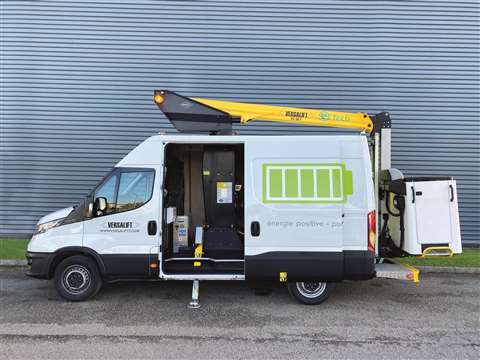 A Versalift van mount with e-Tech. (Photo: Versalift)
A Versalift van mount with e-Tech. (Photo: Versalift)
With a mobile app available, operators can also check the status of the battery directly from their device, allowing them to keep an eye on the battery level and condition while working at height.
The battery pack can either be fitted retrospectively to existing Versalift platforms or installed on new production builds.
More widely Versalift offers different hybrid systems for vans, pickups, and trucks, in both 12- and 48- volt configurations, and with either Lithium-ion or VRLA Gel batteries. In addition, a hybrid system can be retrofitted to a current Versalift product via a relatively straightforward upgrade.
As things are today, prospective purchasers have three basic options: invest in a fully electric vehicle and platform, choose a hybrid platform mounted on a hybrid-driven vehicle, or opt for a hybrid platform on a conventionally fuelled vehicle.
“For now, the most workable, most affordable option for complying with the new regulations is the latter,” says Versalift French subsidiary director, Laurent Cuyolla. It’s a recommendation that reflects the current state of electric vehicle technology.
Hybrid van mounts
On the one hand, the few fully electric vans on today’s market, such as those produced by industry frontrunner Renault, aren’t able to cope with heavier platform designs, says Versalift.
That’s because both payload and driving range must be reduced to an extent that significantly reduces their feasibility for most operators. “A fully electric setup might be okay for short stops in a city center setting,” says Andy Bray, manager of Versalift UK.
“But once you have to get out on the highway, you’re quickly going to run into some limitations.”
On the other hand, there’s the price. Today’s electric vans and other suitable professional-grade vehicles cost around twice that of their conventionally fuelled cousins.
For cost-efficiency focused public service bodies and private providers alike, that’s a significant barrier.
Therefore, Versalift’s recommended solution for most contexts is a hybrid system where a diesel vehicle is equipped with an electric motor and rechargeable battery pack to drive the platform.
When using a vehicle of this type, the platform can be operated with both the diesel engine and the electric motor.
“A hybrid platform is a good solution if you are not ready to go all-in on electric,” says Cuyolla.
“And almost all of our platforms can be offered in a hybrid form, providing there is a sufficient vehicle payload, since the extra weight of the battery pack must be taken into account.”
Versalift’s strategy is to start applying electric platform technology to a conventional vehicle to learn how things work best - how the battery lasts, or the optimal temperature range.
In 2000 France Elévateur, launched its ecological label, which includes the eco-pack, which allows working at height in electric mode with the chassis engine switched.
This concept has become a standard option and a dozen models in France Elévateur’s range meet emission reduction criteria, and can be mounted on electric, hybrid or gas carriers.
The company says it was a forerunner in the green market with its all-electric 091 Fcce model, exhibited at COP 21 in 2015 in Paris.
Access equipment restrictions
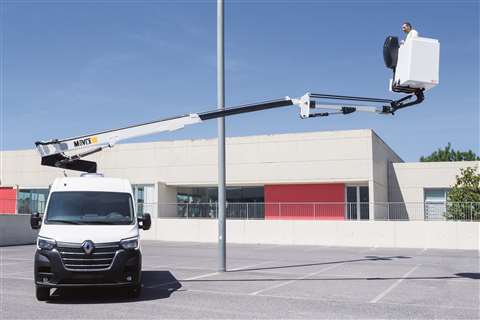 Movex will launch the ATL15, mounted on the gas-powered Piaggio Gas. (Photo: Movex)
Movex will launch the ATL15, mounted on the gas-powered Piaggio Gas. (Photo: Movex)
France Elévateur’s hybrid CNG gas-powered model, with an eco-pack currently has the greatest autonomy while respecting rules of CO2 reduction in urban environments in particular.
The company said, “We are receiving more and more requests for environmentally friendly aerial platforms and carriers. Fighting global warming and reducing greenhouse gas emissions has become a major concern.”
In addition, municipalities are also introducing more restrictions on access to city centers.
Sibling company Movex will launch the ATL15, mounted on the gas-powered Piaggio Gas, this year to join the company’s existing ATL12, mounted on the Alkè electric vehicle.
UK-based specialist Aldercote has been specialising its product range to address specific application requirements while complying with national and European standards.
For customers looking to reduce their carbon footprint in the UK, one of the van mounted sector’s largest markets, Aldercote says it has an advantage since all engineering, design and manufacturing is done in the UK.
“Due to our success, we are now expanding our export business to increase our global market presence,” said the company.
Back in 2016, Aldercote started to review its portfolio to see how it could become more sustainable. This culminated in the electronic platform, E-Drive launched in May 2020.
This battery-operated platform has the benefit that the engine is turned off while the platform is in operation, and the battery is recharged while driving between jobs.
Since December 2021, E-Drive is now standard in all Aldercote models as the company no longer sells engine-driven platforms.
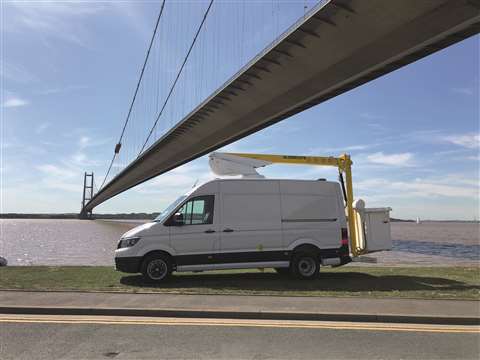 Aldercote van mount with E-Drive under the UK’s Humber Bridge. (Photo: Aldercote)
Aldercote van mount with E-Drive under the UK’s Humber Bridge. (Photo: Aldercote)
A second new feature is the Bluetooth-enabled remote diagnostics tool. This tool, as the name suggests, remotely identifies operator error against machine faults, significantly reducing customers’ downtime.
Moreover, if the issue cannot be resolved remotely, field-based engineers are already fully informed of the issue prior to arrival, enabling them to bring the necessary equipment with them to customer site.
Sustainable lifting equipment
Looking to the future the company says it will strive to take an ever more sustainable path. “We continuously strive to reduce customers’ running costs by investigating features that will provide fuel savings until a commercially viable commercial electric vehicle is available.
“The current focus is to optimize the van mount design to further improve the product weight, without jeopardizing the outreach or payload. To this end, a new product launch is imminent.”
France-based Klubb has also been developing its green credentials, as well as undergoing change as a business.
Private equity company Andera Partners took a significant stake in Klubb Group in July last year to aid its growth in Europe and internationally.
Following the investment by Andera Partners’ activity Andera MidCap, Klubb’s CEO Julien Bourrellis remains the majority shareholder.
Founded in 2001 by Bourrellis and headquartered in Ferrières-en-Brie, France, Klubb started life as a distributor for Versalift in France. Since stepping out in 2015 as a manufacturer of its own vehicle mounted platforms, the company has experienced strong growth.
Since its move to manufacturing, Klubb has made two acquisitions to strengthen its European footprint, notably its distribution subsidiary in the UK, CPL. The group said it plans to accelerate its mergers and acquisition (M&A) strategy with the integration of other European players.
Technological trends
Echoing the view of environmentally friendly equipment, Klubb says under the current technological trend more and more of its customers are implementing Corporate Social Responsibility policies, including environmental issues with a target to use sustainable solutions for their operations.
“And we noticed an acceleration of the phenomenon in the last months with the strong energy price increase and the implementation by cities or communities of a traffic ban for the most polluting vehicles,” says Julien Bourrellis, president, Klubb Group.
“Our customers turn to electric or gas solutions, and the niche market is becoming a mass market.” In 2022, Klubb will sell more than 100 vehicles that are 100% green, notably the Renault Master e-tech 52kW, the Peugeot e-expert 50kW or the gas chassis Iveco Daily.
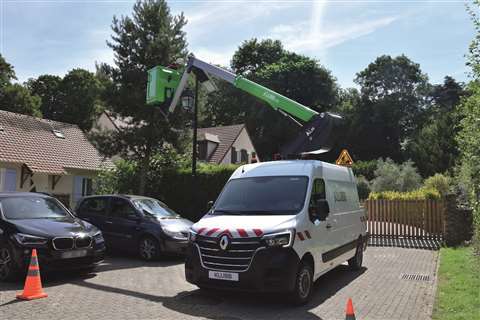 Klubb’s KL26 on a Renault Master with e-tech. (Photo: Klubb)
Klubb’s KL26 on a Renault Master with e-tech. (Photo: Klubb)
However, diesel engines are not yet set to disappear, says Bourrellis.
“Today, 25% of our aerial platform production is already hybrid. Indeed, even if the vehicle itself still runs on old energy sources (petrol/diesel), our green pack option, which allows the use of the aerial work platform, is 100% electric.
“This is why we are not sure whether the number of 100% electric aerial platforms will increase in the near future, as unfortunately the production of this type of vehicle is not going as quickly as expected.”
On this subject, the company does offer a range of electric units. The 100% electric KL21B, on the Peugeot e-Expert, is designed to work in tight areas while maintaining adequate storage capacity and payload.
The KL32, the company’s bestseller, on Renault Master ZE, was improved in 2021 with the release of the KL32 Light version which allowed a gain of 140kg of payload.
It is now the 100% electric version that is being released, available with van and truck versions.
STAY CONNECTED



Receive the information you need when you need it through our world-leading magazines, newsletters and daily briefings.
CONNECT WITH THE TEAM







